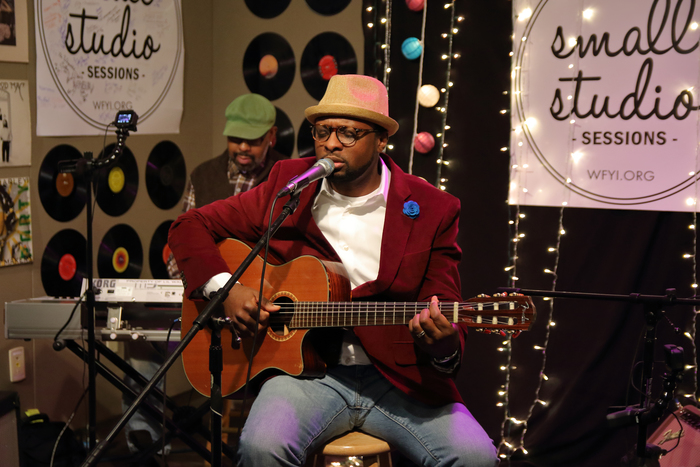You can’t help feeling a sense of awe when encountering Tyron Cooper. Cooper is a man of extraordinary talents, possessing a masterful skill on the guitar and a rich, expressive singing voice. Words by Kyle Long, adapted from NOTE Magazine.
Film Scores: A Bigger Tent for Creativity
Cooper is also an accomplished academic and currently serves as both an associate professor of African American and African Diaspora Studies at Indiana University, and the director of the school’s Archives of African American Music and Culture. Over the last decade, Cooper has added another dimension to his work, as a four-time Emmy winning composer for PBS.
Scoring was not an early aspiration for Cooper, who grew up performing gospel music with his family band The Cooper Singers. Cooper recalls that the opportunity to film scores happened entirely by chance, “I was appearing in a documentary about the opera singer Angela Brown. That’s when I met WFYI producers Clayton Taylor and Bob Williams. After that project they asked if I was interested in scoring.” Cooper was indeed interested, and he developed a strong relationship with WFYI that lead to scoring an acclaimed list of projects that includes Attucks: The School That Opened a City and Eva A-7063.
NOTE recently spoke with Cooper to learn more about his work composing music for films.
What attracted you to scoring films?
The first project that I did was for WFYI, scoring a theme for the documentary Open Door: China in Indiana. That project really sparked a strong curiosity in me, in regard to scoring being a space where I could learn about other communities.
Scoring is one of the best ways I’ve found to engage with other people- and on their terms. You have to buy into their narrative from a sociopolitical and sociocultural perspective. You have to understand the nuances of how other people go about life and put all that into some kind of sonic representation. So, scoring really requires you to engage the community on a deeper level.

In recent years, there’s been an increased scrutiny and criticism of the of the film industry’s lack of diversity. Any thought’s you’d like to share regarding the lack of opportunity for black composers in the film industry?
If you follow historical trends in the broader entertainment industry, African Americans have always been situated on the margins, while at the same time doing much of the definitive work in creating the sounds, textures, and styles that now give definition to the entertainment industry. For example, if you think about the emergence of rhythm and blues and how that evolved into rock and roll, and how many African American artists have not received the credit that was due to them.
So, there’s always been his type of alternative trajectory for African American artists in the entertainment industry. I believe we’ve made some progress, but there’s much more to do.
You have a lot of identities as a musician. How has scoring films impacted other aspects of your creative work?
For me, film scoring started out as a compartmental creative zone. But over time I realized that the ideals behind film scoring, in terms of being really broad in your creative thinking, started seeping into my musical language in general. I’m now far more open to new ways of approaching musical creativity.
I often think about film scoring as being a portal for me to enter the lives of other people, and how I think about the responsibility I have in being trusted to elevate those said lives through musical interpretation. So, I’m always thinking about what people might say when they hear the sounds I use to represent them.
WFYI Public Media is the NPR affiliate for central Indiana. To learn more about the films Attucks: The School That Opened a City, and Eva A-7063, visit www.wfyi.org.







Leave a Reply